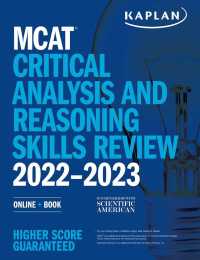Full Description
This book critically explores how and to what extent artificial intelligence (AI) can infringe human rights and/or lead to socially harmful consequences and how to avoid these. The European Union has outlined how it will use big data, machine learning, and AI to tackle a number of inherently social problems, including poverty, climate change, social inequality and criminality. The contributors of this book argue that the developments in AI must take place in an appropriate legal and ethical framework and they make recommendations to ensure that harm and human rights violations are avoided. The book is split into two parts: the first addresses human rights violations and harms that may occur in relation to AI in different domains (e.g. border control, surveillance, facial recognition) and the second part offers recommendations to address these issues. It draws on interdisciplinary research and speaks to policy-makers and criminologists, sociologists, scholars in STS studies, security studies scholars and legal scholars.
Contents
Chapter 1: Impacts of Artificial Intelligence: An Overview (Aleš Završnik, PhD, Katja Simončič, PhD).- PART I: AI IN DIFFERENT DOMAINS.- Chapter 2: Confusing prevention with prediction: the open challenges of AI applied to criminal justice (Michele Miravalle, PhD).- Chapter 3: Artificial Intelligence and Human Rights Safeguards Examined through the Lens of Criminal Justice Covert Surveillance Operations (Ger Coffey, PhD).- Chapter 4: Artificial Intelligence and Sentencing from a Human Rights Perspective (Felix Butz, Stephan Christoph, PhD, Stefan Harrendorf, PhD, Katrin Höffler, PhD, Johannes Kaspar, PhD, Lucia Sommerer, PhD).- Chapter 5: Modern warfare, artificial intelligence and the threat to human rights (Kristian P. Humble, PhD).- Chapter 6: Border control goes digital and profiles you: Insights from the new ETIAS regulation (Valeria Ferraris, PhD).- Chapter 7: Technical and legal challenges of automated facial recognition technologies (Patricia Faraldo Cabana, PhD).- Chapter 8: Artificial intelligence and prohibition of discrimination (Karmen Lutman, PhD).- Chapter 9: The educational AI system: Which potential for children's autonomy? (Deborah De Felice, PhD, Mariavittoria Catanzariti, PhD).- PART II: HOW TO TACKLE AI: POLICY, REGULATION, GOVERNANCE.- Chapter 10: In defence of ethics: How ethics assessment of AI systems can complement the international human rights law? (Aleš Završnik, PhD).- Chapter 11: A Survey of Approaches to Computational Ethics (Ljupčo Todorovski, PhD).- Chapter 12: The role and responsibilities of businesses under international human rights law (Lane Lottie, PhD).- Chapter 13: The Automated Surveillance Marketplace (Yung Au, PhD).- Chapter 14: Issues and Best Practices in Using Artificial Intelligence for Public Policy Decision-Making (Marko Drobnjak, Teja Pristavec, PhD).- Chapter 15: Democratizing the Governance of AI: From Platform Monopolies to Platform Cooperatives (Katja Simončič, PhD).- Chapter 16: When AI fails, can AI incident databases improve accountability and support human rights? (Rowena Rodrigues, PhD, Nicole Santiago, Anaïs Rességuier).








